Business
Housing Starts Catch Breath in U.S., Go Full Steam Ahead in Canada
Published
3 years agoon
By
admin
Permits Still Exceeding Starts
In the U.S., new home building, which seemed set to keep surging, has lost some of its momentum in the last two months.
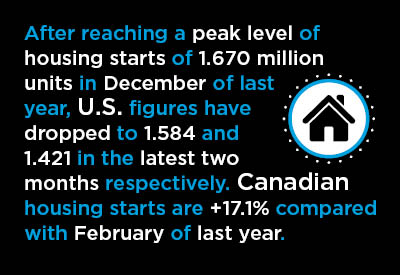
In Canada in February, there was only a minor hesitancy in the headlong rush of residential groundbreakings, due to Toronto ‘playing it cool.’
Let’s look at the U.S. first. After reaching a peak level of housing starts of 1.670 million units in December of last year, the figures have dropped to 1.584 and 1.421 in the latest two months respectively.
The bias of work still leans towards single-family starts, which in February were -8.5% month to month, but +0.6% year over year. Multi-family starts lost support, declining -15.8% m/m and -28.5% y/y.
Regionally, only the West managed percentage-change increases in housing starts both m/m and y/y in February, +17.6% and +15.8%. The Northeast was -39.5% m/m and -2.5% y/y; the Midwest, -34.9% m/m and -29.9% y/y; and the South, -9.7% m/m and -16.6% y/y.
To date in 2021, the South has accounted for half (50.8%) of all housing starts nationally. The West has claimed a share a little bigger than a quarter (27.1%). The other two regions have approximately split the remainder (10.5% for the Northeast and 11.6% for the Midwest).
One shouldn’t become too discouraged by February’s pullback in total U.S. housing starts. Residential permits, which are a leading indicator for starts, have continued strong. In the latest month, they were 1.682 million units, +17.0% y/y (although they were -10.8% m/m).
Over the past 12 months, the number of permits issued in units has exceeded the number of starts, also measured in units, by 100,000.
Climbing Mortgage Rates and Prices Apply a Damper
It seems one can’t talk about housing construction without also delving into the subject of prices.
The Census Bureau’s price deflator for new single-family houses under construction is currently +6.8% year over year. This is likely to move up in even livelier fashion over the next several months given the recent rapid increases in lumber prices.
The Census Bureau’s average sales price for new single-family housing is ahead by +7.8% y/y.
The S&P CoreLogic Case-Shiller 20-city composite price index for resales of existing homes is ahead +10.1% year over year.
Seemingly, slightly increasing mortgage rates and prices that are rising, not yet alarmingly (see next section on Canada), but noticeably nonetheless, are putting a mild and probably temporary damper on the new home building marketplace.
As another indication of the slowdown, the number of months’ inventory of new single-family homes for sale (as tabulated by the Census Bureau) touched a quite low 3.5 in July of last year. By February of this year, the inventory number was up again to 4.8 months.
It should be noted, though, that 4.8 remains tight. The inventory number usually lies between 5.0 and 6.0 months.
Graph 1: U.S. Monthly Housing Starts
Seasonally Adjusted at Annual Rates (SAAR)

Data source: U.S. Census Bureau (Department of Commerce).
Chart: ConstructConnect.
Graph 2: U.S. Single-Family & Multi-Family Monthly Housing Starts
Seasonally Adjusted at Annual Rates (SAAR)
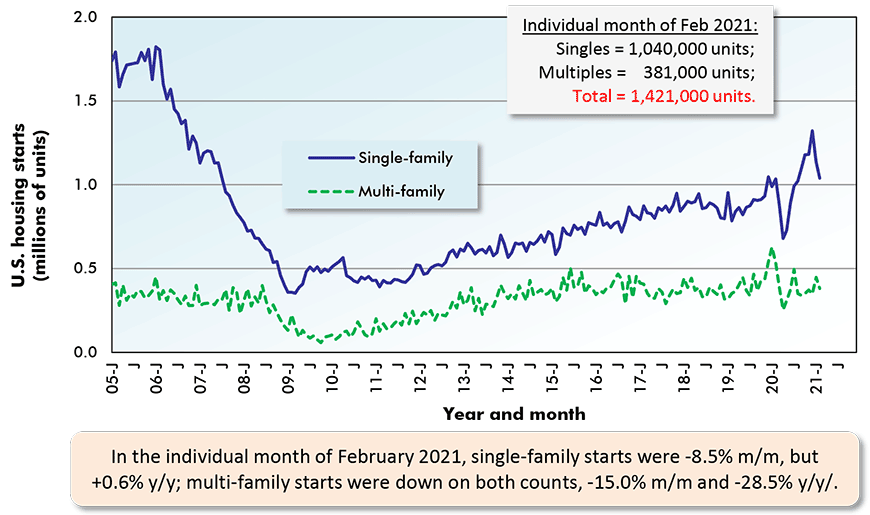
The last data points are for February 2021.
Data source: U.S. Census Bureau (Department of Commerce).
Chart: ConstructConnect.
Graph 3: U.S. Total Monthly Housing Starts
Seasonally Adjusted at Annual Rates (SAAR)

The last data points are for February 2021.
Data source: U.S. Census Bureau (Department of Commerce).
Chart: ConstructConnect.
Graph 4: U.S. Monthly Residential Building Permits
Seasonally Adjusted at Annual Rates (SAAR)
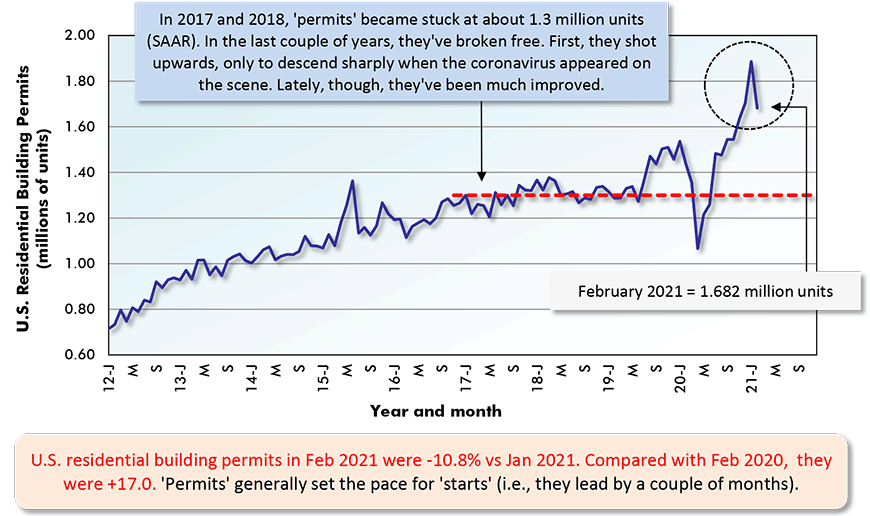
The last data point is for February 2021.
Data source: U.S. Census Bureau (Department of Commerce).
Chart: ConstructConnect.
Graph 5: U.S. Regional Housing Starts

Data source: U.S. Census Bureau (Department of Commerce).
Chart: ConstructConnect.
Graph 6: U.S. Housing Starts
Jan-Feb 2021 vs Jan-Feb 2020 % Changes
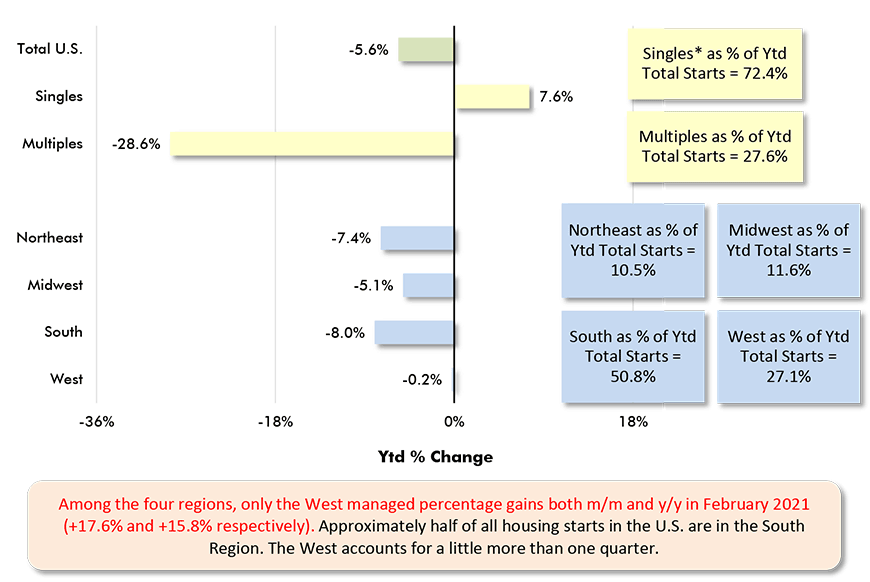
Based on averages of monthly seasonally adjusted and annualized (SAAR) unit starts.
* ‘Singles’ includes townhouse complexes, except when multiple units have common heating & air conditioning.
Data source: U.S. Census Bureau.
Chart: ConstructConnect.
Graph 7: U.S. and Canada Monthly Housing Starts
Seasonally Adjusted at Annual Rates (SAAR)
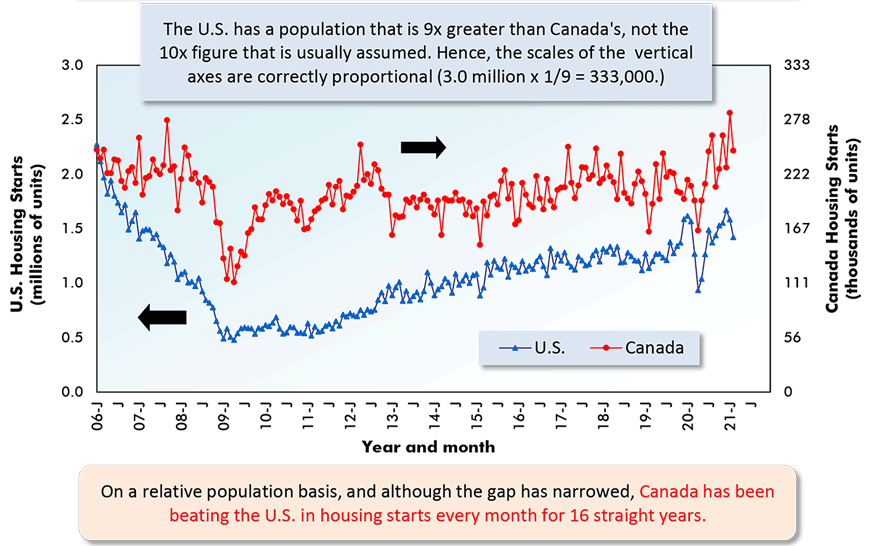
The last data points are for February 2021.
ARROWS: U.S. numbers to be read from left axis; Canadian from right axis.
Data sources: U.S. Census Bureau & Canada Mortgage and Housing Corp (CMHC).
Chart: ConstructConnect.
Canadian Housing Starts Full Steam Ahead, Without Toronto
Canadian housing starts are continuing full steam ahead. In February, it’s true they fell back on a month-to-month basis (-13.5%), but they stayed inordinately high, at 246,000 and +17.1% compared with February of last year.
Their ‘off’ performance m/m was only because January’s level was so exceptionally bullish, 284,000 units, a peak level dating back decades.
Unusually, though, the current strength in Canadian housing starts is coming without help from Toronto.
Toronto’s residential groundbreakings have been -8% in total and -13% in the multi-family segment (i.e., condo towers) for which the city has become famous.
Ottawa-Gatineau has also been off its game this year relative to last year. The nation’s capital is experiencing a -21% drop in total housing starts to date in 2021.
Picking up the slack have been Montreal (+58% ytd), Calgary and Edmonton (both at +37%) and Vancouver (+36%).
There are 35 census metropolitan areas (CMAs) in Canada. As for total starts in those 35 urban centers, however, the degree of dominance exerted by the nation’s six cities with populations in excess of a million each is rather startling. Toronto, Montreal, and Vancouver combine to account for half of the total. Add in Calgary, Edmonton, and Ottawa-Gatineau, and the share rises to two-thirds.
Whole World Taking Notice of Canadian House Prices
The whole world is taking notice of what’s happening with the pricing of Canadian housing. According to the Canadian Real Estate Association (CREA), resale home prices nationally are +25.0% y/y.
The number of explanations for why pricing in the Canadian housing market appears to be so untethered from almost all other economic indicators (and it’s been this way for a long time) is lengthy, interesting and only so-so helpful.
Let me offer a possible alternative story. The two primary investment vehicles for individuals are the stock market and real estate. In the U.S., the NASDAQ index has risen by 800% since 2009. In Canada, the ascent of the Toronto Stock market over the same time frame has been a measly +100%.
Canadians, conservative by nature, have pumped money into housing as a supposedly sure bet to realize better capital appreciation than they are likely to see elsewhere.
Graph 8: Canada Monthly Housing Starts
Seasonally Adjusted at Annual Rates (SAAR)
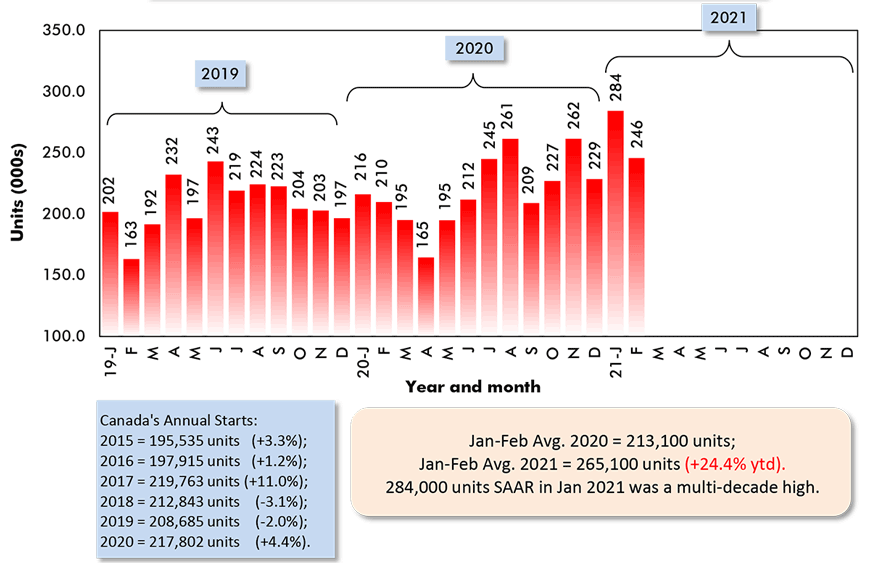
Data source: Canada Mortgage and Housing Corporation (CMHC).
Chart: ConstructConnect.
Graph 9: Percent Change in Year-To-Date Housing Starts –
Ranking Of Canada’s Provinces
(Jan-Feb 2021 vs Jan-Feb 2020)
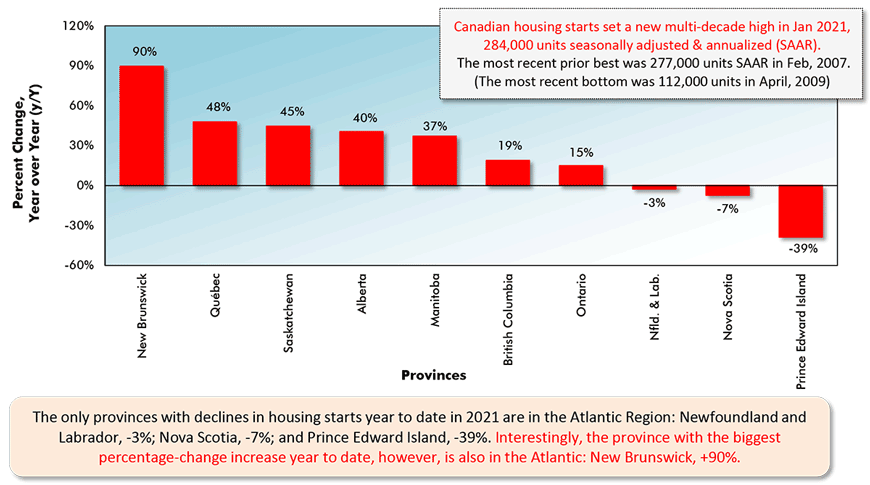
Data source: Canada Mortgage & Housing Corporation (CMHC) based on actuals rather than seasonally adjusted data.
Chart: ConstructConnect.
Graph 10: Percent Change in Year-To-Date Housing Starts –
Ranking Of Canada’s Major Cities
(Jan-Feb 2021 vs Jan-Feb 2020)
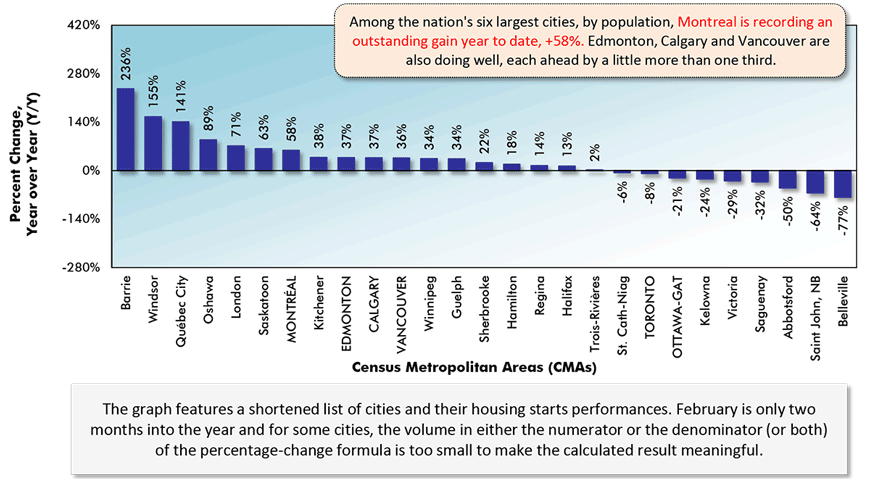
Canada’s Census Metropolitan Areas (CMAs) have core populations of 50,000 plus.
Canada’s 6 CMAs with populations in excess of 1 million are in capital letters.
Data source: Canada Mortgage & Housing Corporation (CMHC) based on actuals rather than seasonally adjusted data.
Chart: ConstructConnect.
Graph 11: Housing Starts in Canada’s 6 Most Populous Cities
January to February 2021 Actuals
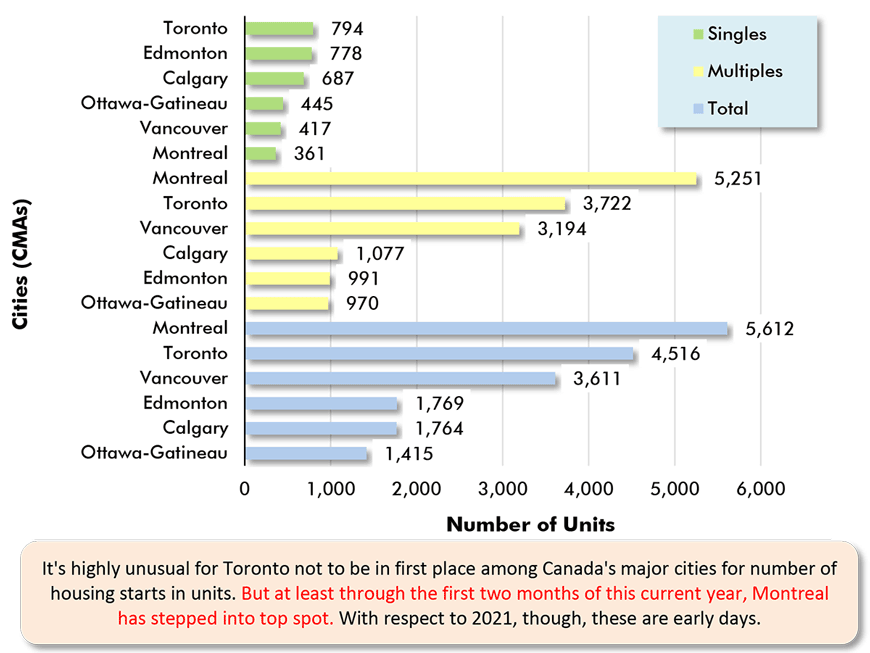
Data source: Canada Mortgage & Housing Corporation (CMHC).
Chart: ConstructConnect.
Graph 12: Housing Starts in Canada’s 6 Most Populous Cities
Jan-Feb 2021 vs Jan-Feb 2020
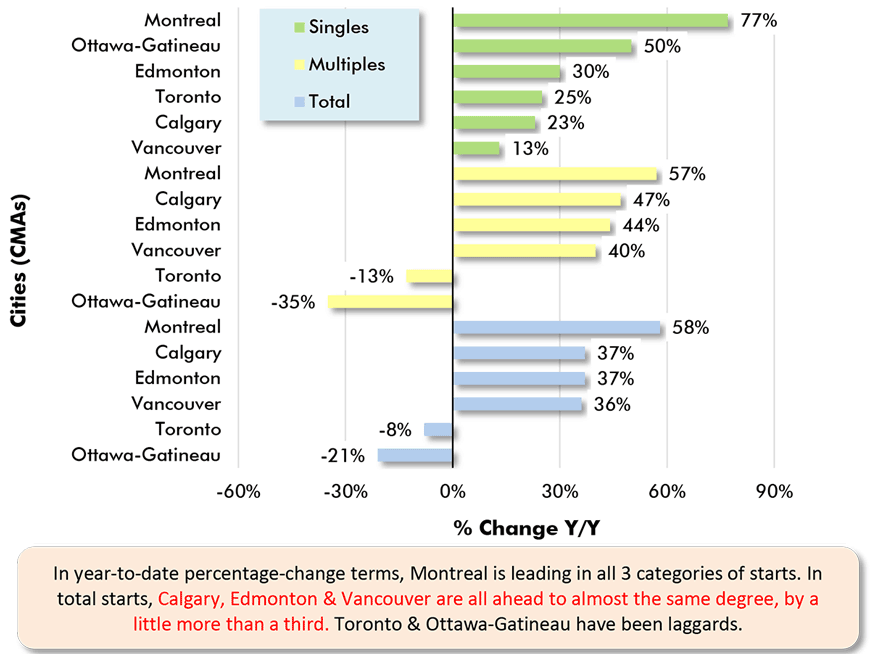
Data source: Canada Mortgage & Housing Corporation (CMHC).
Chart: ConstructConnect.
You may like
-


Manufacturers: Are You Prepared for the Risk of Higher Borrowing Costs?
-
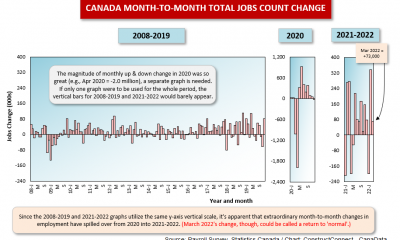

Canada’s March Jobs Report: Total +73,000; Construction +14,000
-


Pertaining to Stock Markets, Central Banks, & Supply Shortage Solutions
-


March’s U.S. Jobs Report: Total, +431,000; Construction, +19,000
-


Strong Retail Sales and Construction Commitments Say No to Recession
-


Where U.S. Jobs Are Sprouting Vs. Withering & Implications for Construction
Business
Qualifications to become a site manager in construction
Published
6 months agoon
November 10, 2023By
admin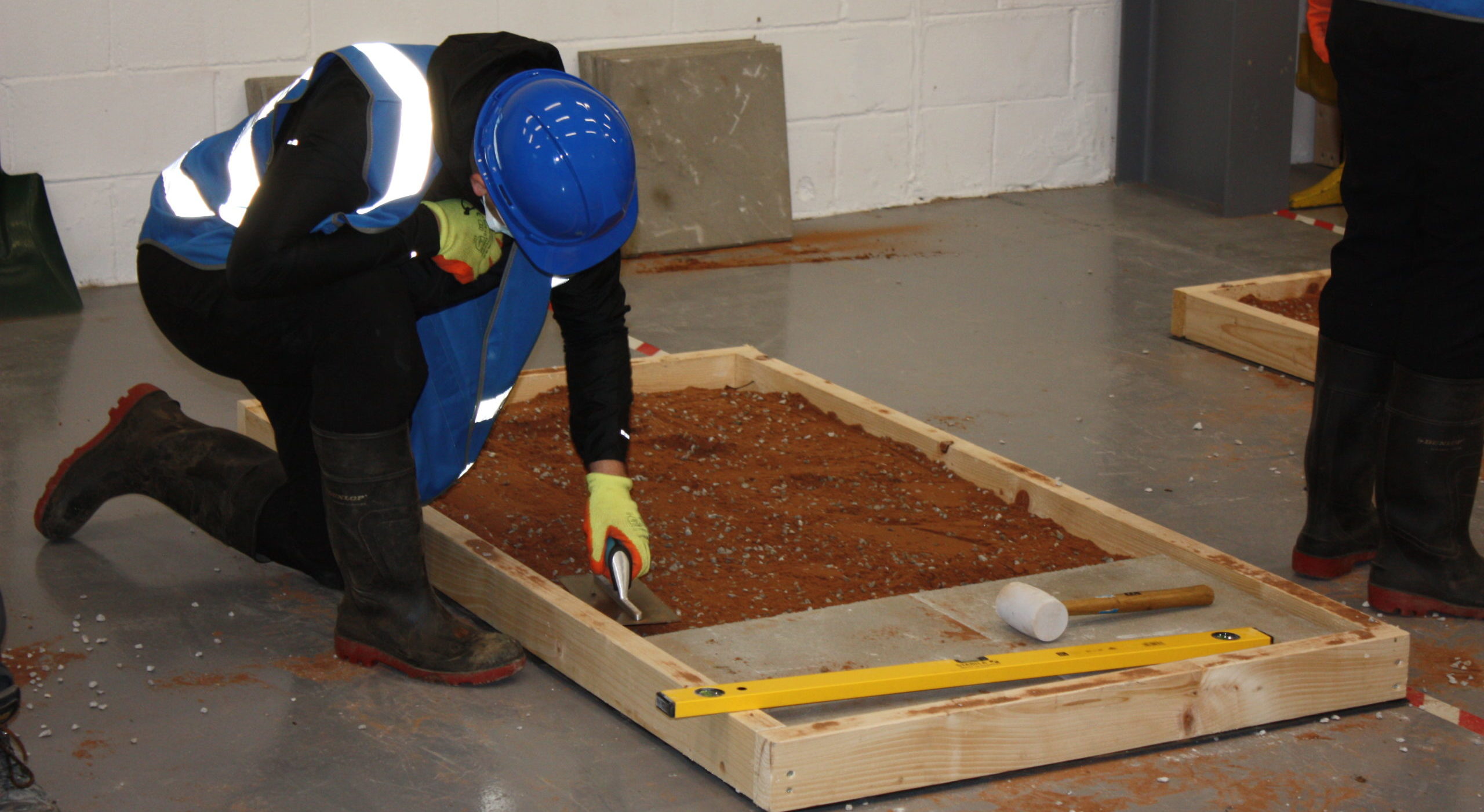

Qualifications to become a site manager in construction.
If you’ve been wondering ‘what qualifications do I need to be a site manager’ or ‘do I need a site manager Construction Skills Certification Scheme (CSCS) card’ to manage a construction site, then you’ve come to the right place.
Highly experienced and knowledgeable when it comes to the training required to work in the construction industry, the SB Skills Solutions team knows exactly what it takes to become a construction site manager.
To help you understand which qualifications are worth exploring and obtaining for this role, we explain the different site manager training routes and which one you should consider taking based on your prior workplace experience and skills.
What is the difference between a site manager and site supervisor?
While a site manager and a site supervisor may seem like interchangeable terms and roles, they actually have differing responsibilities. While a site supervisor position is generally an entry-level role, a site manager position requires either more relevant experience in the industry or a higher qualification.
Site managers tend to have the additional responsibility of managing several construction sites at once, whereas site supervisors typically concentrate on just one location.
What qualifications do you need to become a site manager?
Unlike some of the other positions on a construction site, site managers have a large amount of responsibility. As a result, they need to have the right site manager qualifications, skills, and experience to ensure the site is operating both efficiently and safely.
However, there’s not just one qualification every construction site manager possesses.
Site manager qualifications include:
- SMSTS (Site Management Safety Training Scheme)
- National Vocational Qualification (NVQ) Level 6 in Construction Site Management
- Level 6 Civil Engineering Site Management Degree
- Higher National Certificate (HNC) in Construction or related disciplines
- Higher National Diploma (HND) in Construction Management or related disciplines
- Foundation Degree in Construction Management
- Degree in Construction Management
- Apprenticeship in Construction Site Manager
- Higher Apprenticeship in Construction Site Manager
You may also need:
- High-Risk First Aid
- Confined Spaces (If it applies to the site)
- Qualifications in the work being carried out
Put simply, this means you can take a variety of routes and qualifications to become a construction site manager. Whether you want to become an apprentice, take an undergraduate degree, or apply for a work-based NVQ, there’s no end of options to explore.
It’s important to bear in mind, however, that each route will have different applicant requirements.
For example, to be considered for an apprenticeship in construction site management, you will need to have a grade C or 4 in GCSE English Language and Mathematics or equivalent level 2 qualifications.
What site manager NVQs do you need?
Equivalent to a bachelor’s degree, an NVQ Level 6 in Construction Site Management is a sought-after
qualification that can take anywhere from just four weeks up to 12 months to complete.
The course can be fast tracked, if desired, but the duration of the course depends mainly on the motivation and availability of the applicant. The ultimate NVQ course is designed to assess the competency of the applicant and is one of the highest qualifications you can achieve in the construction industry.
After obtaining this qualification, you will be one step closer to being able to apply for your site manager CSCS card (commonly known as a black card) which can help you to secure employment as a construction site manager.
What HS&E Test certificate do you need?
Before you can apply for a CSCS card, however, you will first need to pass the required level of CITB
(Construction Industry Training Board) Health, safety and environment (HS&E) test within the past two years.
To apply for a manager CSCS card, you will need to apply for and pass the CITB Managers and Professionals HS&E test or an approved alternative. You can use CSCS’s card finder to discover which CSCS card you are eligible to apply for based on either your occupation or qualification.
Alternatively, if you know which HS&E test certificate you require to obtain your desired position in the construction industry, then you can book your HS&E test here.
How do you get a Black CSCS Card?
Keen to obtain your black card from CSCS? If so, you will need both the relevant NVQ qualification as well as a completed CITB Managers and Professionals HS&E test. If you’ve taken an SMSTS course, then this can be put towards achieving your NVQ Level 6 in Construction Site Management.
If you’re not sure how your current qualifications can help you to become a construction site manager or want more information regarding the site manager CSCS card, then contact the experts at SB Skills Solutions.
We can provide you with professional guidance and advice, and direct you towards relevant site manager training courses.
Find out more about becoming a construction site manager
If you’d like to learn more about becoming a construction site manager, obtaining your black CSCS managers card, or you require more information regarding the site manager qualifications you can obtain at SB Skills Solutions, please feel free to get in touch with our team today.
Our Construction Site Management NVQ Level 6 qualification is ideal for individuals that are already working in the construction industry and are eager to increase their earning potential.
This course is designed to help the participants build their construction competence, skills, experience, and knowledge.
Every NVQ assessor at SB Skills Solutions has at least ten years of relevant experience and possesses either the Level 6 Construction Site manager NVQ, PTLLS (Preparing to Teach in the Lifelong Learning Sector), or Assessor Award, so you can rest assured that you’re in highly knowledgeable hands.
The site management course paired with our qualified assessors can ensure you have everything you need to begin a career as a construction site manager. To find out more about this Level 6 qualification, please don’t hesitate to contact our friendly team today.
To speak directly to a member of our team, simply give us a call on 01695 558420. Alternatively, you can also get in touch by sending your enquiry via email to info@sbskills.co.uk.


Keen to explore all your career options – including a position as a plant operator?
Luckily, the team of expert tutors at SB Skills Solutions have helped countless companies upskill their employees as well as numerous individuals obtain essential qualifications to achieve their dream job in the construction industry and further afield.
From the average plant operator salary in the UK to which qualifications, skills, and training courses can help you to become a plant operator, we explain everything you want to know about this profession.
What do construction plant operator jobs involve?
As a plant operator, you’ll be required to carry out a wide range of tasks. Primarily, this will include the operation, monitoring, and maintenance of heavy machinery like diggers, bulldozers, cranes, and excavators.
With help from these machines, you may be asked to move, excavate, lift, or crush building materials or organic matter.
In the event that these machines stop working or develop inefficiencies, a plant operator will be on hand to rectify any issues and support productivity. This role tends to also cover the maintenance of these machines, ensuring they’re in good working order.
A more comprehensive list of plant operator responsibilities can include:
- Supervising and overseeing operations
- Monitoring process parameters
- Performing maintenance tests
- Ensuring safety rules are followed
- Operating heavy machinery and equipment
- Transporting a variety of materials
A construction plant operator may have more specific daily duties such as:
- Operating forklifts, bulldozers, excavators, trucks, and more heavy machinery
- Transporting and storing building materials and earth
- Carrying out safety checks
- Level out working areas
- Communicate using radio signals
What are the working conditions like?
A construction plant operator will often be required to work outdoors in a range of weather conditions. Construction sites aren’t squeaky clean like an office or control room. You may work at heights such as operating a tower crane or a large excavator.
Instead, the working conditions for a construction plant operator tend to be significantly dirtier and nosier than alternative plant operator positions. Due to the nature of the building construction industry, you may also be required to work nights or weekends in order to deliver the necessary progress within the set construction deadline and budget.
How much does a plant operator earn?
According to information published by Totaljobs, a plant operator salary in the UK varies between £27,681 and £37,500, with an average annual salary of £32,500. It’s worth bearing in mind that the exact salary for this position will naturally vary depending on the location of the job and the industry that you work in.
Higher-paying positions are more accessible to individuals that upskill themselves, allowing them to work in a wider range of relevant industries. This is because plant operators tend to specialise in just one type of equipment.
What skills do I need to become a plant operator?
Unsure whether you have the necessary skills to become a plant operator? Below, we list some of the most common skills plant operators possess that can help them to succeed in both this role and their chosen industry. These plant operator skills include:
- An interest in heavy machinery and equipment
- Ability to operate, fix, and maintain machinery
- Understanding of engineering, maths, and computers
- Problem-solving capabilities
- Ability to use relevant computer software
- Strong attention to detail
- Excellent teamwork skills
- Ability to work independently
- Able to work well under pressure
Construction plant operators must also possess certain physical skills like excellent movement and coordination.
What qualifications do construction plant operators need?
In England, if you want to become a construction plant operator, you could obtain either your Level 2 NVQ (National Vocational Qualification – practical, work-based qualifications) in Construction Plant Operations, your Level 2 Construction Plant Operative Apprenticeship qualification, or your Level 3 Diploma in Construction and the Built Environment.
In addition to these qualifications, you may also need to apply for your blue CPCS (Construction Plant Competence Scheme) Competence Card or your CSCS (Construction Skills Certification Scheme) accreditation to work on a construction site as a plant operator.
What courses and training can I take to become a plant operator?
There are many routes you can take to become a plant operator. Some of these avenues involve applying for an apprenticeship, while others require work experience in the relevant industry to get you started.
To help you determine which route might be right for you, we explore each of these avenues in more detail.
College or training provider
As mentioned above, a course from either a college or training provider in Level 2 Certificate in Construction Plant Operations or Level 3 Diploma in Construction and the Built Environment can provide you with the relevant qualifications to become a plant operator.
While these courses will cover most of the required skills to join this profession, on-site experience is also crucial to obtaining a construction plant operator role, so many applicants will seek out a trainee position on a construction site following completion of the course.
For the level 2 course, you’ll need two or more GCSEs at grades 9 to 3 (A* to D), while a level 3 course requires four or five GCSEs at grades 9 to 4 (A* to C). Without GCSEs, you must hold an equivalent qualification.
Trade work
Working your way up is one of the more common ways you can become a plant operator. Often, if you’re enthusiastic enough and willing to work hard to obtain the relevant plant operator skills and qualifications, many employers will consider offering individual work as a general labourer with training opportunities.
They may request certain GCSEs grades (in subjects like English, maths, and technology), but they can provide you with invaluable on-site experience with heavy machinery and equipment.
Once you’ve gained enough experience and knowledge of the construction industry, they may contact a training provider to help you obtain the relevant qualifications to become a plant operator.
Career path and progression
Once you’ve managed to secure a plant operator position, there is still room for career progression. Often, one of the best ways to both increase your earning potential and develop your career in this industry is to specialise in a broader range of machines and equipment. This will allow you to work in different plants and positions.
Contact SB Skills Solutions
If the potential for career progression and the day-to-day duties of a construction plant operator seems like a good fit for your skills and professional aspirations, why not get in touch with the knowledgeable team at SB Skills Solutions to find out more about our plant operator course?
Our qualified team of experienced assessors can help you to obtain your NVQ Level 2 Plant Operations qualification, and by extension, achieve your blue CPCS Competence Card.
Recognised by the Construction Plant Competence Scheme (CPCS) and NPORS this NVQ can increase your earning potential while providing you with sought-after skills, experience, and competence in plant operation.
With the right support, we can ensure you learn the relevant skills and knowledge to become a plant operator. To find out more about the contents of the plant operator course, our prices, or alternative construction training courses, please don’t hesitate to contact our friendly team today.
To speak directly to a member of our team, simply give us a call on 01695 558420. We also welcome enquiries submitted via email to info@sbskills.co.uk. After receiving your plant operator course enquiry, we’ll ensure a prompt response to your query or a schedule a call to learn more about your training requirements.
Business
How to Become a Construction Site Manager
Published
8 months agoon
September 14, 2023By
admin
Construction site managers are responsible for small sections of a construction project all the way through to management of entire development projects.
This role is diverse and not for everyone, but if you feel that you can take on the responsibility of a construction site manager, then look no further.
The team of expert training providers at SB Skills Solutions has created the only guide you’ll need to become a building site manager. Use this guide as your map to your future construction site manager job!
Below, we explore the role, earning potential, and day-to-day duties of a building site manager. We also explain which site management qualifications are necessary to obtain this position and the routes you can take to secure a construction site manager role.
What is a site manager?
A building site manager (also referred to as a construction site manager or site agent) is in charge of overseeing the day-to-day running of a construction site. Their role revolves around supervising the construction project as a whole, so they have the responsibility of ensuring every contractor is working safely and efficiently.
As well as liaising with contractors, they’ll also commonly work alongside architects and surveyors. A construction site manager helps the entire team stay on track, ensuring the building project is finished on time and within budget.
A building site manager will generally work in one of the five project groups; residential, commercial, industrial, environmental, or infrastructure. Your experience and area of interest in construction will often dictate which group you end up working in.
What does a site manager do?
Due to the supervisory nature of this position, the roles of a site manager are wide and varied. Depending on the size of the building project, these duties can range from ensuring the project stays on budget to ordering materials and liaising with clients.
It’s important to also note that a building site manager must be versatile as they will often be required to split their time between working on-site, working in an office, and working in a temporary office built on site. Frequently working in a variety of weathers (hot, cold, and wet!), they must be content wearing protective and high-visibility clothing, too.
While construction site managers tend to work the standard working week, they may be expected to work during weekends or evenings in order to meet deadlines, when necessary. Alternatively, the nature of some construction projects means the building work can only be undertaken at night or during public holidays.
As a building site manager, you may be required to:
- Supervise workers
- Hire subcontractors
- Monitor and report progress to staff
- Liaise with clients
- Purchase materials for the project
- Conduct safety inspections
- Carry out quality inspections
- Motivate the construction team
- Solve problems
- Prepare and create progress reports
- Analyse site reports, designs, and drawings
- Utilise specialist computer programmes
- Work in a variety of environments
- Liaise with the community and handle public demands
- Interpersonal skills
How much does a construction site manager earn?
The part you’ve all been looking for, so we will get it over with now. According to Check a Salary, a site manager in construction can earn anywhere between £37,500 to £74,880 per year!
With an average annual salary of £56,996 in the UK, there’s scope to earn a higher salary as a construction site manager if you move into more specialised roles or start your own construction-related business.
It’s also worth bearing in mind that the exact salary for this position will naturally vary depending on the location, employer, and level of responsibility. You could also improve your earning potential and career options by gaining chartered status to help showcase your competency to prospective clients and future employers.
Construction manager qualifications in the UK
Wondering ‘what qualifications do I need to be a site manager’? As you might imagine, construction site managers need higher level qualifications than most site workers as they are responsible for everything on site.
If you already work within the construction industry, you may be able to become a construction site manager by completing some site manager training courses. Site manager qualifications include:
You may also need:
- High-Risk First Aid
- Confined Spaces (If it applies to the site)
- Qualifications in the work being carried out
SMSTS
The SMSTS is a management course designed to teach managers or potential managers, the legislation involved in the building, construction, and civil engineering industries.
Construction Site Managers will also learn the importance of carrying out risk assessments, putting control measures in place, and adhering to health and safety regulations in order to create a culture of safety awareness.
The SMSTS course is a 5-day classroom-based learning experience that is valid for 5 years. This can be renewed with a short 2-day refresher.
NVQ Level 6 in Construction Site Management
The NVQ Level 6 in Construction Site Management is one of the highest levels available and is equivalent to a bachelor’s degree.
Taking anywhere between 4 weeks to 12 months to complete (depending on the applicant’s availability, motivation, and desire to fast track the course), this course is an in-depth assessment of your competency at construction site management. This is one of the ultimate NVQs in the construction industry with very few above it.
Not only does this NVQ in construction site management prove you are a competent site manager, you are then able to apply for your Black CSCS managers card which can be used to access construction sites and work as a manager.
What is the black CSCS card and why do you need it?
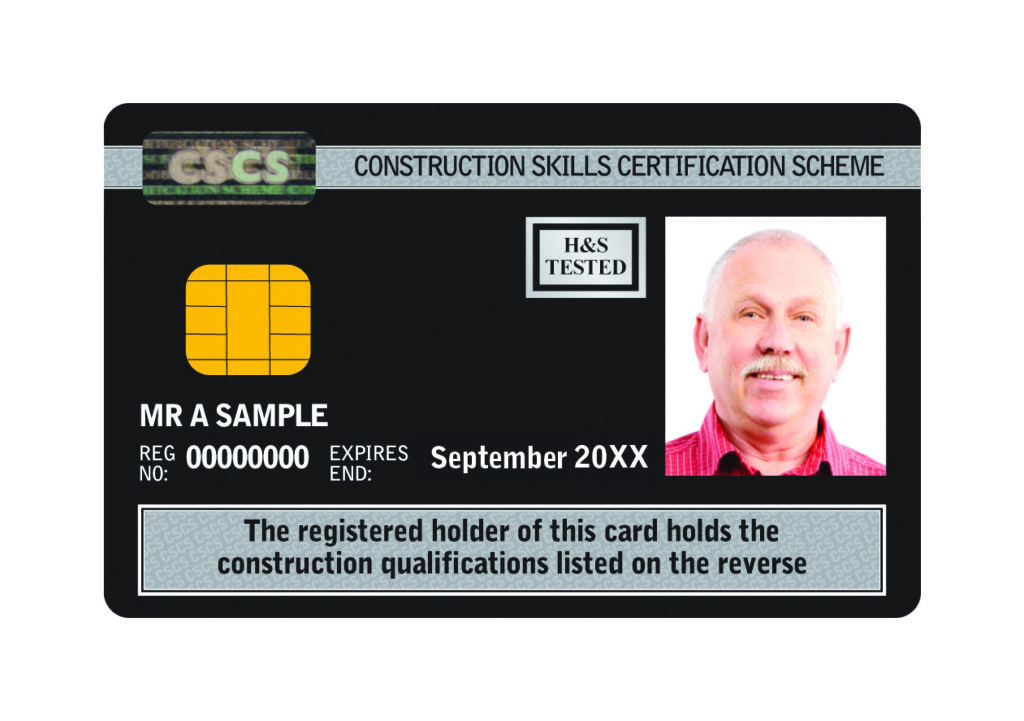
The Black CSCS Card is a construction site manager card that proves your competency in managing sites. This card proves to employers that you are qualified for the job and you can work safely on a construction site.
Employers need to prove that they are compliant with Construction Design and Management regulations (CDM) which aims to ensure everyone has the correct skills and qualifications for the job role they are completing.
Having the Black CSCS Card has also shown to increase your earning potential and job offers. Employers like to see that a potential employee is competent already and this card shows just that. Employers will know that after a short company induction, you’ll be ready to hit the ground running and won’t need your hand, held every step of the way.
How to become a construction manager
Getting a job as a construction site manager may seem daunting, but with the right skills, experience, and qualifications (which we can equip you with), you’ll be there in no time. There are a few routes that you can take to become a construction site manager, the first route is the apprenticeship route.
University
The university route is also an option if you want to become a building site manager as it will teach you everything you need to know about construction site management. Each university course will have specific entry requirements, with the duration of study often being between three and four years.
Depending on your A-level results, level 3 diploma qualifications, or your life experience if you’re applying as a mature student, you will have the choice of taking a foundation degree, a Higher National Diploma (HND), or an undergraduate degree accredited by the Chartered Institute of Building (CIOB).
Suitable subjects of study for one of these construction-related university degrees include building studies, estimating, and surveying, alongside construction, and civil engineering.
The SMSTS management course is also available to those with a bachelor’s degree. It explains the importance of risk assessments, control measures, and health and safety regulations to provide site managers with a comprehensive overview of construction legislation. Valid for five years, this course takes roughly six months to complete.
The only downside to this route is that you won’t be able to apply for the Black CSCS card. However, you can apply for the academically qualified card which is also a very prestigious card.
Work
If you’d rather take a more traditional route, you may decide to find a job in a relevant trade (such as an estimator, building technician, surveyor, or site supervisor). From there, you can take courses that will upskill you and work your way up to management.
This could be a lengthy process, but chances are if you’re reading this, you’re almost there and looking to progress. From this point, you should undertake your SMSTS course and look to achieve your Black CSCS card.
Skills
If you want to increase your chances of obtaining either employment or professional experience within the construction industry, with a view to becoming a building site manager, you may want to consider expanding upon your current skillset.
Some additional skills that could help you to achieve your goal of becoming a construction site manager include:
- Time management
- Leadership qualities
- Understanding of construction
- Excellent verbal communication skills
- Problem-solving abilities
- Business management
- Strong desire to take initiative
- Organisational skills
- Maths knowledge
- Computer literacy and the ability to use relevant software
What are the career prospects of a construction site manager?
In terms of career progression, it’s common for building site managers to become contract managers or project consultants, or to specialise in a certain area of construction such as building inspection or estimation.
Becoming chartered through the CIOB is often the first step into building on your professional prospects as it’ll provide you with more career options.
Construction site manager courses at SB Skills Solutions
If you’d like to explore the more traditional route of finding a job in trade and then taking a construction site manager course, contact SB Skills Solutions today.
With the Construction Site Management NVQ Level 6 qualification under your belt, you can increase your earning potential, secure a sought-after building site manager position, and work on your construction skills, competence, experience, and knowledge.
Guided by the experienced NVQ assessors at SB Skills Solutions (every assessor holds the Level 6 Construction Site manager NVQ, PTLLS (Preparing to Teach in the Lifelong Learning Sector), or Assessor Award with a minimum of ten years of relevant experience), we make obtaining this qualification straightforward.
With the support of our qualified assessors, you can achieve all the necessary qualifications to be a site manager. To learn more about the course, its contents, or our prices, please don’t hesitate to contact us today.
You can also call us on 01695 558420 or send us your enquiry in an email to info@sbskills.co.uk. Once we’ve received your enquiry, you can rest assured that a member of our team will be in touch soon to find out more about your site manager training requirements.
Trending
-
Jobs2 years ago
Project Manager – Oxford
-
Jobs3 years ago
Commissioning Engineer Security Industry
-
Jobs2 years ago
Airport Retail Sales Assistants
-

 Business5 years ago
Business5 years agoHow To Renovate a Victorian House
-

 Business3 years ago
Business3 years agoHow to Get a Gold Supervisory CSCS Card
-
Jobs2 years ago
PASMA labourer in Cirencester
-

 Tech3 years ago
Tech3 years agoIt Won’t Make You the $6 Million Man, But Hilti’s EXO-10 May Save Your Arms, Back
-
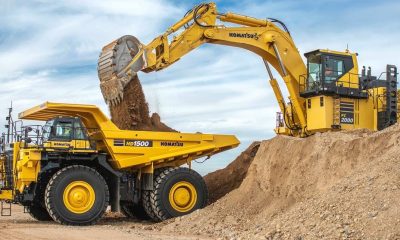
 Tech2 years ago
Tech2 years agoKomatsu launches new HD1500-8E0 rigid-frame dump truck



